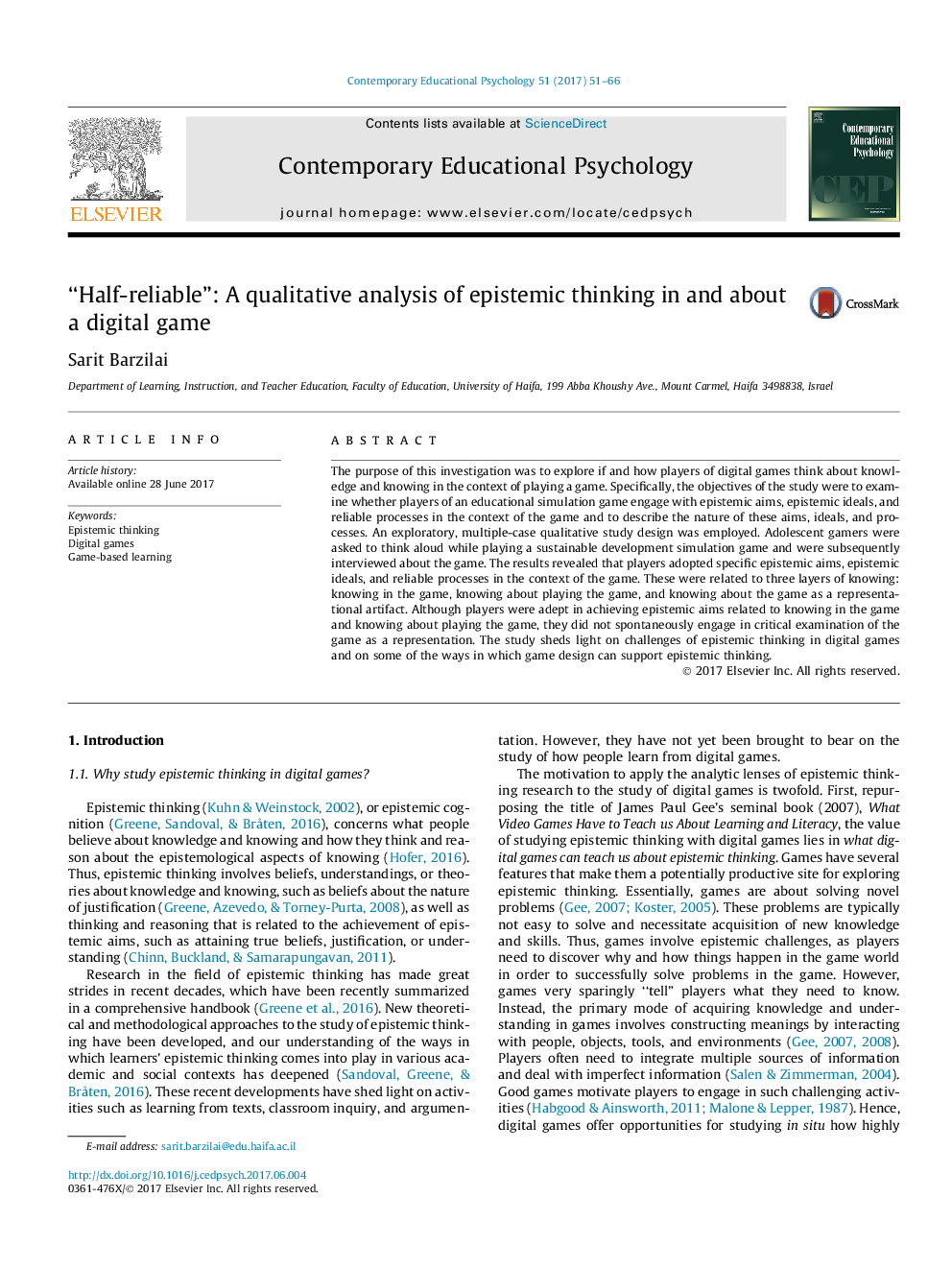| کد مقاله | کد نشریه | سال انتشار | مقاله انگلیسی | نسخه تمام متن |
|---|---|---|---|---|
| 4937844 | 1434668 | 2017 | 16 صفحه PDF | دانلود رایگان |
عنوان انگلیسی مقاله ISI
“Half-reliable”: A qualitative analysis of epistemic thinking in and about a digital game
ترجمه فارسی عنوان
یک نیمه اعتماد؟: تجزیه و تحلیل کیفی تفکر معرفتی در یک بازی دیجیتال و در مورد آن
دانلود مقاله + سفارش ترجمه
دانلود مقاله ISI انگلیسی
رایگان برای ایرانیان
کلمات کلیدی
تفکر معرق بازی های دیجیتال، یادگیری مبتنی بر بازی،
ترجمه چکیده
هدف از این تحقیق این بود که ببینیم که آیا و چگونه بازیکنان بازی های دیجیتال در مورد بازی و دانش در مورد دانش و دانستن آن فکر می کنند. به طور خاص، اهداف این مطالعه بررسی اینکه آیا بازیکنان یک بازی شبیه سازی آموزشی با اهداف معرفتی، آرمان های معرفتی و فرآیندهای قابل اطمینان در زمینه بازی و تعریف ماهیت این اهداف، آرمان ها و فرآیندها تعامل دارند. یک طرح تحقیق کیفی اکتشافی، چند مورد مورد استفاده قرار گرفت. از بازیگران نوجوان خواسته شد در طول بازی شبیه سازی بازی توسعه پایدار با صدای بلند فکر کنند و بعدا در مورد بازی مصاحبه شدند. نتایج نشان داد که بازیکنان اهداف خاص معرفتی، آرمان های معرفتی و فرآیندهای قابل اطمینان را در زمینه بازی به رسمیت می شناسند. اینها به سه لایه دانستن مربوط بود: دانستن در بازی، دانستن در مورد بازی کردن بازی و دانستن در مورد بازی به عنوان یک آثار نمایشی. اگرچه بازیکنان در رسیدن به اهداف معرفتی در مورد شناختن در بازی و شناختن در مورد بازی در این بازی معرفت داشتند، اما به طور انحصاری در بررسی بحرانی بازی به صورت نمایشی دخالت نمی کردند. این مطالعه بر چالش های تفکر معرفتی در بازی های دیجیتالی و برخی از راه هایی که طراحی بازی می تواند تفکر معرفتی را پشتیبانی کند، روشن می کند.
موضوعات مرتبط
علوم انسانی و اجتماعی
روانشناسی
روان شناسی کاربردی
چکیده انگلیسی
The purpose of this investigation was to explore if and how players of digital games think about knowledge and knowing in the context of playing a game. Specifically, the objectives of the study were to examine whether players of an educational simulation game engage with epistemic aims, epistemic ideals, and reliable processes in the context of the game and to describe the nature of these aims, ideals, and processes. An exploratory, multiple-case qualitative study design was employed. Adolescent gamers were asked to think aloud while playing a sustainable development simulation game and were subsequently interviewed about the game. The results revealed that players adopted specific epistemic aims, epistemic ideals, and reliable processes in the context of the game. These were related to three layers of knowing: knowing in the game, knowing about playing the game, and knowing about the game as a representational artifact. Although players were adept in achieving epistemic aims related to knowing in the game and knowing about playing the game, they did not spontaneously engage in critical examination of the game as a representation. The study sheds light on challenges of epistemic thinking in digital games and on some of the ways in which game design can support epistemic thinking.
ناشر
Database: Elsevier - ScienceDirect (ساینس دایرکت)
Journal: Contemporary Educational Psychology - Volume 51, October 2017, Pages 51-66
Journal: Contemporary Educational Psychology - Volume 51, October 2017, Pages 51-66
نویسندگان
Sarit Barzilai,
